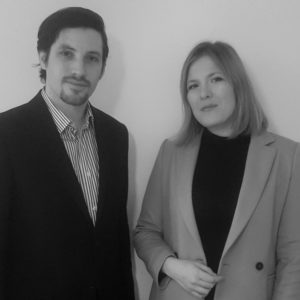

Sébastien Lachaussée & Elisa Martin-Winkel
Video Games and French labour law
The French are now 31 millions people playing video games. It is three times more than ten years ago and the video game industry records an important growth since 40 years. Therefore in 2013, the French video game industry turnover was estimated at 2.7 millions euros, that is to say twice as much than the cinematographic turnover. Especially video games made in France are highly marketable outside of their country: More than 80% of the production is selling out of frontiers. By the way we note that the French studio Ubisoft is the third publisher of the sector in the world.
The video games industry is in a perpetual growth and it generates a lot of jobs in France. Especially video games development represents by itself more than 80 % of jobs in this sector. Therefore in 2013 studios have clear 400 millions euros of production budget in France. However it’s not an idyllic situation: Production societies were three times more numerous 15 years ago and a lot of creators and technicians are working in foreign countries, especially in Canada and in the USA. Those successive shut down raise questions about the economy, the profitability of video games production, but especially about work methods. Therefore it seems that contractual practices don’t fit with the activity restrictions.
A LOT OF PERMANENT CONTRACTS, LOW SALARIES AND A SECTOR IN DANGER:
Unlike animation employees, which are often occasional workers, video games employees are most of the time working under permanent contracts. Therefore in studios like Asobo Studio or Quantic Dream, there is a majority of employees under permanent contract. At Quantic Dream for example, 40 of the 120 employees are working for the society since more than 7 years.
This stability of the workforce shows the wish to retain talents but it’s also a compensation for French salaries, often lower than in other countries. For example, in 2011, a novice visual artist was earning 125 000 $ per year (almost 90 000 €) in the USA, 60 000 € in Great Britain and 43 000 € in France. But this amount is dropping. Therefore today an American novice visual artist “only” earns 50 000 $ per year, where the drop in softer in Europe, with 40 000 $ per year on average. In fact permanent contracts offer salary guarantees (social security insurance, unemployment insurance…), which are the twin of a little lower salaries.
However, according to Fabrice Fries, permanent contracts have an inherent fault: “ Video-games creation jobs works project by project, therefore it is clearly made of busy and quiet moments. However permanent contracts are the norm in French studios, which can be an obstacle to employment.” By contrast English studios, which benefit from a more flexible labor law, have four times more workforce than French studios.
Finally video-games industry is in a permanent danger: Since 10 years there is a noticeable drop of workforces and a lot of studios bankruptcy, which confirm the tendency. However recently there is a development of employment under temporary contracts in French a studio, which leads to a lack of job security for some employees. Fabrice Fries reminds: “ in practice video-games industry is already using some “tricks” in order to circumvent permanent contracts under unfavorable conditions for employees: abuses of temporary contracts, subcontracting with so called “external consultant” (which could be reconsider by a Court as a internal employee), audiovisual subsidiary creation which apply occasional worker laws when their activities as nothing to do with audiovisual creation.”
All those analysis underline the fact that there is a necessity to make contracts more flexible in the sector and to put specific and adapted measures.
A NECESSARY RELAXING: INTERMITTENT JOBS OR PROJECT CONTRACTS?
Since à long time, video games producers are aspiring to escape from permanent and temporary contracts rigidity, alluding intermittence solution. In the beginning of the 2000s, Pierre Carde, LyonGame’s director and supervisor for the Multimedia works producers association (Apom in French), was underlining that “ while being a taker for short time contracts, corresponding to limited missions, the sector was caring for not increasing the industry instability”, on the base of intermittence.
But intermittence is difficult to establish in the video games industry because it’s not made for this sector, even if 16% of societies have a SIC code corresponding to “recreational, cultural and sportive activity” which allowed entertainment intermittent employment. And if in fact the number of employees being under intermittent contracts is low, the multimedia crisis, which is appearing, forces some societies to adopt new management methods, favoring intermittent jobs to permanent team constitution and intern know-hows development. Yet, it’s not desirable. Indeed, it’s making employee’s situation precarious and reducing studio’s work quality.
The law of June 25, 2008 concerning the modernization of the labor market allows temporary contracts for a define object realization subject to a branch agreement or a company rules and regulation providing it. Predicted for five years, the status has been extended for a year: Until June 27, 2014.
In this respect, the Cour des Comptes referendary counselor, Mister Fabrice Fries was esteeming in his report entitled “Propositions in order to develop the video-game industry in France” that “the video game sector seems to be a perfect ground for a project contracts application”. Therefore this new contract would get round permanent contracts use without destabilizing employees.
However this kind of contract is only applicable to engineers and executives, and so not to all jobs necessary for a video-game development. Yet, a recent report of the National Syndicate for Video-Game Companies (SNJV in French) notes that there is a few of executives in development studios: They are representing an average of 40% of the workforce. Therefore the project contract application as it already existing would not allowed to durably change management studios practices.
In this sense, in 2012, SNJV was asking for “ a compatible contract of employment with video-games pace of work and the very high strain on key jobs, which became essential. It will allow a better attractiveness for companies and a better loyalty among the staff through a longer term of visibility.”
However it’s obvious that in case of project contracts coupled with amicable layoff in the end of the project, uncertainty on project success will weigh heavily on staff and not on studios. Therefore it’s important to find a balance between sector durability and employees protection, especially on compromises like job security, departure bonus, and varied guarantees (training programs, reclassification, reenlistment priority…) for employees accompanied by flexibility for studios.
CONTRACT OF EMPLOYMENT AND COPYRIGHT: A DIFFICULT BALANCE TO FIND:
Video-games development is often a question of requests for which studios put a team in charge of it. The problem is that, on the contrary of a Work made for hire provided by the Copyright Act, request agreements aren’t automatically causing a right transfer. Therefore Article L 111-1 alinéa 3 of the French Intellectual Property Code (CPI) states, “The existence, or conclusion of a letting contract, for good or services, by the author doesn’t imply any dispensation to enjoy of the right”. So the contributor is still holding the creation.
One question remains: What about the video-game qualification? Indeed, is it a collaboration work or a collective one, which has very different consequences in French law about transfer of rights. About this subject, opinions are differing; therefore there is no clear qualification for video games.
Copyrights adjustments to video games special features are necessary. In April, 2012, a mediation mission between video games stakeholders and collective management societies highlighted the necessity to recognize video games as “creative work”, according to Article L 112-2 of the CPI, and to define its special features on a distinctive point of the article. Therefore video games would be different of software or audiovisual works, and video games societies would be clearly defined.
This mission led to two proposals: The first one corresponds to classical copyright general principles and is inappropriate to the sector special features; and the other one follows interests and practices of the sector but implies a lot of adjustments to Copyright. We are going to develop the last one.
The video game company is defined as “a legal entity implementing staff, technical and financial resources, know-hows and skills necessary to video game creation”. This proposal provided a simplified transfer of rights on an automatic attribution based on a legal presumption. Just like in the audiovisual sector, author’s remuneration is proportional.
Note that this proposal is the fruit of compromises and that it isn’t satisfying all sector requirements, even less collective management societies. Those ones are strictly opposed to copyright infringements asked by producers unions. They are contesting “ video game publishers violent hostility against copyright” (Multimedia Authors Company (SCAM in French) press release). They are demanding a strict application of copyright law but, unfortunately, aren’t reaching any compromise in terms of form. For the record, the Dramatic Authors and Composers Company (SACD in French) was in favor of the audiovisual regime where the SCAM preferred to see video games as collective works, just like journalists works.
To conclude, the Chantepie mission is a failure, which led to a senators Gattolin Retailleau report in 2013. In a section named “the thorny question of copyright”, they are establishing that “ a majority of French studios made the choice to interest employees to video games results as compensation for a transfer of their rights. It seems that this system is satisfying employees.” Indeed claims are rare and there is no union demand about copyright application. Studios solution seems to be hybridization between the collective work automatic transfer and the collaboration work proportional remuneration. Therefore the sector adopted his own functioning system and it’s about time for legislator to declare null or confirm it.
SHARE THIS ARTICLE
CONTACT
OUR OFFICES
INFORMATION
sl@avocatl.com
PHONE
+33.1.83.92.11.67
Address
121, boulevard de Sebastopol
75002 Paris
5th floor / Staircase A
Follow us :
Newsletter
Please enter your e-mail :
